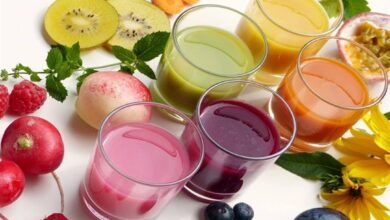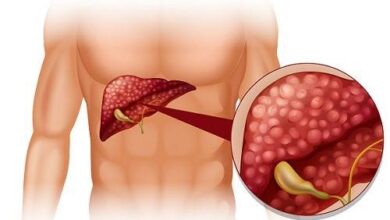Proper nutrition prevention from summer problems

Investigation: Randa Gerges
Many people practice wrong nutrition habits in the summer, exposing them to increase the risk of developing health problems, the most prominent of which is to overcome meals, not to maintain the moisture of the body, excessive eating of heavy and fatty foods, soft drinks and sugars, and not including meals enough fruits and vegetables that contain the necessary nutrients, and in the coming lines a group of experts and specialists talk about this topic In detail.
Dr. Ahmed Abdel Hamid, a specialist in internal diseases, The summer season is a seasons in which the risk of food poisoning increases significantly, due to the high temperatures, which provide an ideal environment for the growth and reproduction of bacteria and viruses in food, and awareness of the importance of cooling food contributes properly to storing food in correct ways, especially during trips or in open restaurants, to avoid the speed of its pollution, as it increases the frequency of barbecue parties and eating Outdoor open -air cuisine, of the possibility of exposure to microbes.
He continues: There are many daily habits that can cause food poisoning without some realization, the most prominent of which is leaving cooked or raw food outside the refrigerator for more than two hours, which allows the reproduction of harmful bacteria, and re -heating the food is more than once from unsafe practices that increase the chances of pollution, and eating meat or poultry is not well -cooked. The same cutting boards for meat and vegetables without cleaning them, to the transmission of germs, in addition to lack of interest in cleaning vegetables and fruits well before eating them, as a result of swallowing the remains of pesticides or contaminated germs, and lack of adherence to the criteria of hygiene and washing hands before preparing food in the transmission of infection.
Dr. Abdul Hamid, that food poisoning can affect the sexes of all ages, but children are the most vulnerable to its complications during the summer, due to the incomplete immune system sufficiently, as the elderly face a greater danger as a result of normal immunity weakness with age, in addition to the possibility of chronic diseases as well as patients with diabetes and cancer, and pregnant women are classified as sensitive groups, where immune changes and hormonal changes in Their bodies and their ability to resist infection.
It shows that the symptoms of food poisoning usually begin within 6 to 72 hours of eating contaminated food, and the incubation period can vary depending on the type of bacterium, and in some cases it is delayed to appear after several days, and includes signs of the most common infection, nausea and vomiting, diarrhea, pain and contractions in the abdomen, fever and a feeling of general weakness, and signs of dryness, especially in severe cases.
He adds: The diagnosis of food poisoning mainly depends on the evaluation of the clinical symptoms that appear on the patient, the review of the dietary history during the 48 hours preceding the start of the signs of the infection, and the appearance of similar symptoms in the digestive system in a group of people eaten the same food indicating the weighting of group food poisoning, and the doctor requests analyzes of stool or blood to determine the type of microbe that causes poisoning, and the food residue can be examined If it is found to reveal the source of pollution.
Dr. Abdul Hamid that prevention of food poisoning during the summer, depends on following a set of preventive measures, starting to keep food in the refrigerator or in a cold place with temperatures less than 5 degrees Celsius, to reduce the growth of bacteria, and cook well until it reaches the safe inner temperature that guarantees the elimination of pathogenic microbes.
And avoid eating exposed or sold foods in the streets, because of the possibility of pollution, with the need to wash hands well before and after preparing food, from the basics of prevention, in addition to ensuring that tools and cutting boards between the use of meat and vegetables to avoid mutual pollution, it is preferable not to eat food residue for more than two days during the summer, even if it is stored in the refrigerator, in order to reduce the risk of infection Poisoning.
Healthy habits
Sinatia Bou Khalil, a nutritionist, explains that the high temperatures and increased sweating during the summer months causes the loss of essential minerals, which leads to the instability of the internal balance of the body, so you should focus on the healthy diet in the hot season, by eating snacks and fresh rich in fruits, vegetables and protein sources free of fat, adding foods such as watermelon, berries, and leafy vegetables to meals to meals to meals to meals to meals to meals Daily, while adopting lighter cooking methods such as something or boiling instead of fatty and fried dishes.
She continues: The necessary hydration must be obtained, as it is very important during the summer, and it is necessary to ensure that a sufficient amount of fluid is obtained daily, by drinking at least two liters of water per day to compensate the minerals lost due to sweating, and reduce soft drinks sweetened with sugar to maintain the perfect moisture of the body and ensure the performance of its vital functions efficiently.
Sinatia Bou Khalil stresses the importance of merging a variety of healthy options from the sources of vegetable protein into the summer diet, such as: soybeans, red beans, and chickpeas, and cold dishes can be inserted into such a cold soup prepared from the components of spinach, celery, tomatoes and sweet pepper, as they give the body a sense of freshness in hot climates, as it is useful for eating milk to get a refreshing experience And nutritious at the same time, and practicing physical activities during the most moderate times a day during the early morning or late evening hours, reduces the risk of exhaustion associated with high temperatures.
Sinatia Bou Khalil warns of some wrong eating habits, which can harm the body in the summer, including: exceeding meals, especially breakfast, as it leads to excessive eating later during the day, which confuses the metabolism process, causes fluctuations in blood sugar levels, thus feeling tired and irritant, and the consumption of fatty and red meat leads to digestive problems and increases the feeling of heaviness Satisfaction, especially in the summer.
She adds: You should monitor your consumption of salt, especially in proportion to the level of physical activity, as it leads to dehydration, with an increase in the amount of water when needed, and the need to reduce the intake of solid fats, fast meals, and processed foods, because they are heavy and difficult to digest, consume additional amounts of water during digestion, and reduce hot foods, because they raise the body temperature in the summer.
Food elements that revive the body
Sushma Gag, clinical nutrition specialist confirms that the summer heat increases the body’s need for hydration, which causes sweating a lot during the summer months, which leads to water loss and some nutrients, so drinking water must be kept, and eating some nutritional sources such as: rich fruits and vegetables with a high percentage of water to revive the body, compensate for lost salts, and provide the body with vital elements, such as vitamin C and potassium And antioxidants.
It explains that the inclusion of fruits moisturizing in the daily diet gives the body the benefits of its total, including preventing fatigue, preventing headaches resulting from drought, in addition to the feeling of refreshment and activity, and we mention, for example:
* Watermelon, which contains 92% of the water, is rich in potassium and other salts, such as fructose, which gives an immediate boost of energy.
* Strawberry is 91% of water, rich in antioxidants and vitamin C, and enhances immunity.
* Smalfs are 90% of the water, enhances immunity, rich in potassium and other electrolyte.
* Rich oranges at a rate of 87% of water, rich in vitamin C and electrolyte.
* Pineapple: 86% of water, helps digestion and anti -inflammatory.
* Long coconut water rich in electrolyte, and low -calorie.
Sushma Gag notes that vegetables are one of the most important food sources rich in water and electrolyte, and some of them help to digest, so it is advised to eat them daily, and is considered low -calorie naturally and rich in antioxidants, and healthy weight management options And it can be added to the salad, soup, juices and raw snacks, which are as follows:
* The cucumber contains 96% of the water, so it is the most vegetable that helps moisturize the body, has a cooled effect, beneficial to the skin, and is rich in fiber.
{Lettuce is one of the low -calorie food sources, and it contains 96% of the water, and plays an important role in improving the digestion.
* Celery is 95%rich in water, as well as potassium, other electrolyte, and fiber.
* Radish contains 95% of the water, purifies the body of toxins, and enhances digestion.
Tomatoes are rich at a rate of 95% of water, and also with electrolyte, such as potassium, tubin and vitamin C.
– Sweet pepper, low -calorie, rich in 92% of water, vitamin C and antioxidants.
Sushma Gag pointed to the need to reduce some nutritional sources on a daily basis, so that the excessive consumption of the body does not harm, among them: mango due to the high percentage of sugar in it and its temperature, and dried fruits rich in calories, but soaking and roasting can be useful in reducing the feeling of hunger, as well as the Jack Fruit fruit because it is rich in calories, and perhaps causing a feeling of swelling, as it leads to eating. Drinks that contain caffeine to dehydration, and it should be noted that onions and garlic have a cooled effect, but the abundance of their intake can cause heartburn in a row.




